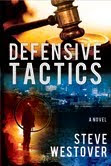
Authors write with the dream and hope of having their work published but the dream is often more challenging than expected. Until I published my first novel, Defensive Tactics, I had ZERO understanding of the publishing business and I had NO idea how competitive the market is. In many ways the publisher is the gate keeper, determining what work is given an audience. Are these determinations made based on personal preference? In some ways, sure. But ultimately publishing is a business and the publisher is in business to make money. Makes sense right. Today I have the opportunity to post my interview with CFI Publisher, Lyle Mortimer. I hope this interview can add insight and a touch of understanding for the aspiring author. I appreciate Mr. Mortimer taking the time to answer many of my questions.
Steve: How did you break into the market as an LDS Publisher?
Mr. Mortimer: Very interesting that you should use the words "break in." It kind of intimates a huge breakthrough or some immediate happening.
I've been working in the LDS market for 30 years. After working for a publishing company for six years, I gathered up some pieces of a publishing company and started Cedar Fort, Inc.
Steve: What are the most significant changes to the LDS market in the past ten years?
Mr. Mortimer: The changes that have shaped the market place are the acquisitions of independent publishers by Deseret Book. These include Bookcraft, Excel, Covenant and Seagull as well as many independent LDS stores. During this same period the marketplace has been difficult for independents. In 2006, the number of independents reduced by half.
Steve: Cedar Fort is known for its eye-catching covers and I notice that you do some of the cover designs yourself. Did you receive formal training for this?
Mr. Mortimer: I started doing cover designs in 1988. My design training came from the theatre field and general education in the arts. Computer design did not develop until some years after that when formal training was not available. We took the new technologies and ran with them. We were the first publishing company in Utah, perhaps the nation, to typeset a book on a Macintosh. We were among the first to use computer-aided design as desktop publishing advanced.
Steve: What do you find most rewarding about being a publisher?
Mr. Mortimer: There is nothing more exciting than finding and developing a new author. Our most prolific author has been very loyal to us and his publishing career has been very rewarding for both of us.
Steve: What is the most challenging?
Mr. Mortimer: The most challenging part of publishing is developing business models that work in such a complicated business.
Steve: Would you like to share any goals Cedar Fort has identified for the next 2-3 years?
Mr. Mortimer: Our primary goals for the next ten years are to enhance the careers of established authors. As we review the previous decade we have grown by 6.1 times. We have had an average growth rate of 22% annually. We would like to continue that for the next decade.
Steve: How are e-books changing the landscape in the publishing world (in general) and with Cedar Fort (specifically)?
Mr. Mortimer: E-books will continue to develop and influence the marketplace. In today's world there will always be a place for companies, which can establish relavence. We are gearing all of our future toward those subjects, which have the most relevance to the largest market possible.
Steve: Will CFI consider acquisitions in e-book format only?
Mr. Mortimer: We cannot forsee e-book only releases because we cannot forsee the technology of e-readers. It could be that the technology exists in the next five years.
Steve: Does CFI plan to break into the national market with clean, non-LDS centered fiction?
Mr. Mortimer: CFI did break into the market with LDS oriented fiction a year and a half ago. We intend to continue releases to the national market by nationally recognized authors with LDS background or themes.
Steve: How would you describe the relationship between CFI and the other LDS publishers?
Mr. Mortimer: As individuals working in different companies we are friends, but the companies themselves have no relationship.
Steve: CFI is very good about giving unknown authors a shot at having their work published. Personally, I really appreciate the opportunity. What advice do you have for aspiring authors?
Mr. Mortimer: As mentioned above in CFI's goals, authors must develop relevance. If they have relevance, they will establish an audience. An audience is a market, which results in success if it is large enough.
Steve: What would you most like authors to understand about the publishing industry and Cedar Fort?
Mr. Mortimer: Publishing is a very complicated business and extremely risky. My primary job is to manage risk. The better we manage risk as a company, the more successful we are. With 30 years experience as one of the most solid and fastest growing publishers in the nation, we have a point of view that often doesn't align with the authors way of thinking.
Steve's Closing Thoughts:
I think when we as authors understand that publishing is a business and that we are creating a product for that business to sell, we are better able to understand our role as a partner with the publisher. Every author is different and so is every publisher. For me, understanding this helps me to not take rejection personally. Not only do we need to offer a high quality product to sell, but our manuscripts also needs to be the right product at the right time for our business partner, the publisher.
For example, right now I am trying to find a publisher for my mid-grade fantasy, Crater Lake: Battle for Wizard Island. It has been a frustrating process because I have received so many rejections from Publishers and Agents. It's hard because I feel that the writing is stronger than my first novel and the story is exciting, BUT, yeah the big BUT, until I can find a match for the product and the publisher, it will remain in my computer where only I and my family can read it. It's nothing personal, just business.
One last note- I want to extend a hearty CONGRATULATIONS to our very own Rachael Renee Anderson as a Whitney Awards finalist. And Congrats to all finalists. I aspire to join you one day. Well done everyone!





























